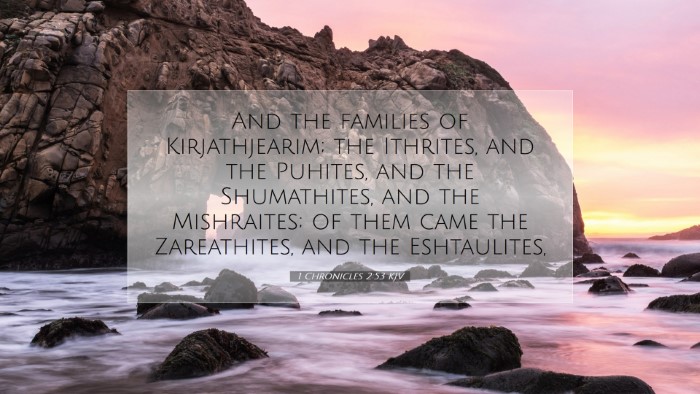Commentary on 1 Chronicles 2:53
Bible Verse: 1 Chronicles 2:53
This verse belongs to a genealogical account that illustrates the expansive family lineage of Jacob’s sons and the importance of these families within the history of Israel. It speaks of the Kenites, descendants of Jethro, Moses’ father-in-law, who became affiliated with the Israelites.
Matthew Henry's Commentary
Matthew Henry notes the significance of this enumeration, particularly in the context of God's providential care over the lineage of His people. He emphasizes that every branch of Israel plays a role in God's unfolding narrative.
Henry points out that the mention of the Kenites illustrates how outsiders can be brought into the covenant community. He astutely observes that the Kenites were closely associated with the tribe of Judah, which demonstrates the inclusivity of God's plan and foreshadows the later inclusion of Gentiles into the faith.
Key Themes from Henry
- Divine Providence: God's hand in guiding history and the families mentioned.
- Inclusivity: The naturalization of outsiders into God’s promise.
Albert Barnes' Notes
Albert Barnes emphasizes the historical significance of this verse in the genealogy records. He discusses how the Kenites were not a part of Israel by birth but were adopted into the community through intermarriage and loyalty to Israel.
Barnes highlights that this integration of the Kenites demonstrates the broader scope of God's redemptive plan. The mention of the Kenites signifies the acceptance of those who align with God’s people by faith, which serves as a reminder for the church today regarding inclusion and unity.
Key Insights from Barnes
- Genealogical Importance: The role of genealogy in confirming identity among God’s people.
- Adoption into the Faith: The relationship of the Kenites to Judah highlights the inclusive nature of God's covenant.
Adam Clarke's Commentary
Adam Clarke offers a thorough analysis of the Kenites and their significance in the narrative of the Israelites. He provides context about their origins and their noteworthy mentions in various biblical texts, analyzing their unique position among the tribes.
Clarke elaborates on how the Kenites’ alliances were significant in military conquests and the establishment of Israelite strongholds. Their skills in metallurgy, specifically ironwork, played a tactical role in warfare, which Clarke likens to God’s provision of gifts through unexpected means.
Key Observations from Clarke
- Cultural Contributions: The Kenites’ expertise in metallurgy and its impact on Israelite society.
- Strategic Alliances: The role of the Kenites in supporting Israel’s military ventures.
Theological Applications
The interplay of lineage and identity communicates a profound theological truth about belonging in the Kingdom of God. Believers today are reminded that they, too, can be part of God's family through faith in Christ, just as the Kenites were accepted into Israel through loyalty and commitment.
This verse encourages a reflection on the notion of covenantal relationships beyond biological ties, hinting at how faith creates community.
Reflective Questions for Further Study
- How does the story of the Kenites inform our understanding of inclusion in today’s church?
- What modern parallels can be drawn from their integration into Israel?
- How can communities of faith better embody the inclusive nature of God's covenant?
Conclusion
1 Chronicles 2:53 serves as a reminder of God’s expansive mercy that encompasses not only His chosen people but also those who seek Him earnestly. The historical narrative of the Kenites, positioned closely to the tribe of Judah, paints a picture of hope for all who wish to commune with the Lord.


